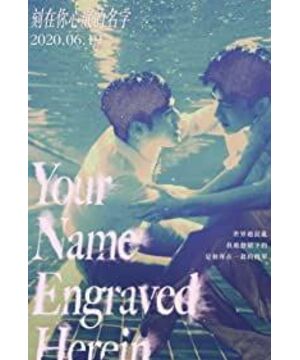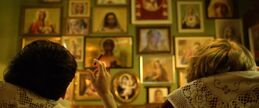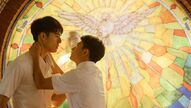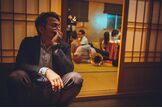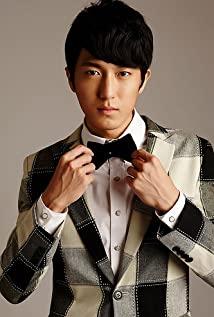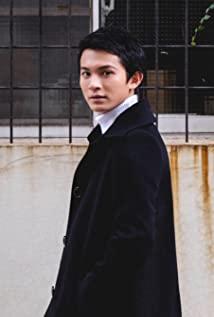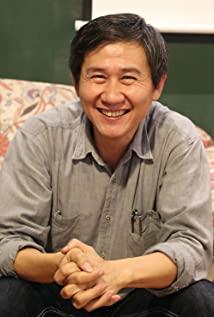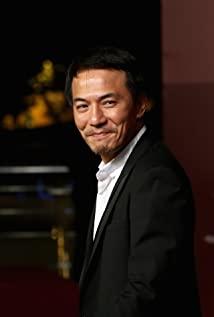Maybe our youth has never been touching
——Written to "The Name Engraved in Your Heart"
As a man, have you ever had your heart set on another man, even for a brief moment?
Do you think it's a shameful thing for a man to fall in love with a man?
Or, have you ever fallen in love with a boy like Wang Bode?
Zhang Jiahan (Chen Haosen) and Wang Bode (Zeng Jinghua), who is the name engraved in your heart.
Different from similar youth themes in the past, "The Name Engraved in Your Heart" is not a movie that pleases the public, even though the director recruited two handsome teenagers with their own idol halo. The story of this film is not complicated. A boy confronts another boy who makes him irresistible with all the innocence of his heart, and the other boy and the world he lives in respond with a slightly joking sarcasm. The more serious he is, the more absurd the world he lives in; the birth of love lies in the mutual echo of another soul, the boy clearly perceives the "heart connection" between the two, but when he wants to go further, the other party Not without sarcasm, he asked: Zhang Jiahan, can you not always follow me out alone? At this time, Zhang Jiahan and Wang Bode, the contrast between the two boys' characters, seems to have been established. I guess many viewers will sigh in their hearts: Look, it's another old-fashioned story of a gay falling in love with a straight man. Zhang Jiahan at this time, no matter how serious he is, no matter how "reasonable" he thinks he is, in the eyes of most audiences, his shouting is nothing but hoarse futile. Compared with Wang Bode, he is just an "abnormal" Another "ridiculous" existence. If the story stays at this level, maybe we will see many viewers' after-thoughts such as: cherish life and stay away from straight men; or: homosexuals, please don't obsess about straight men and so on.
Why don't most viewers like this movie? First of all, the character setting of this story goes against the common perception of homosexuality of the public living in a heterosexual context. The youthful handsomeness in gay stories is often questioned as "unreal", and the intimacy or mutual support between men is often ridiculed as "selling corrupt" by audiences including LGBT groups. Perhaps in the eyes of many people, only the thirsty old man who threw himself at Zhang Jiahan in the park or the so-called "promiscuity" in the bathroom of Chengdu MC has the right to exist in a "realistic" sense. But they may have forgotten that old men are not born old men; they also seem to have forgotten to ask about this, why some people can only express their lust for the same sex in a hidden corner without light , is there only naked sex in the homosexual world? Going a step further, does each of our bodies belong to us, and what does body rights mean to everyone? How should the term promiscuity be defined? Who defines it? Does our body have a right to privacy that cannot be violated at will by others? Why can people wantonly abuse the subject of the candid camera instead of the candid photographer who invades the privacy of others? etc.
Of course, the public dislikes and is lazy to think, because thinking means life is full of doubts. People are reluctant to face the truth, especially the truth they don't like. This story also destroys the romantic imagination of the love hero as always in the minds of audiences who like romantic narratives: in a closed environment where there are taboos between men and women, how is it possible for a brave boy to steal balloons for the girl he likes, and even make a public declaration of love in public Will be gay. This is probably the most ironic plot setting of the film. Wang Bode can speak out angrily for the school's ban on dating between men and women, but he can't calmly face the real source of lust in his heart, and even persuade "good brothers" to try to date girls. In the cultural context of heterosexuality, all of Wang Bode's actions seem to exude a strong taste of straight men, which is what people usually consider as "normal" as a man.
All the behaviors of a man that were considered "normal" were finally "forcibly" overturned by the director. Is this a contradiction? Is it a problem with the director's narrative?
Boys are not allowed to peek at girls! Boys are not allowed to harass girls! If any boys dare to cross the iron net, please report to the Disciplinary Office immediately! . . . Such voices were sharp and loud, filling the strict religious schools of the 1980s. But as Wang Bode realizes, things that are publicly included in the "taboo" list will not weaken people's curiosity about them. On the contrary, "taboo" will cast a mysterious veil on the unknown field. , what is hidden behind the veil will only arouse people's curiosity to find out. The "taboo" between the opposite sex forms an ironic contrast with the society's default channel of heterosexual relationship and the law of heterosexual marriage. Wang Bode and Wu Ruofei are well aware that this kind of "taboo" set up for the college entrance examination not only will not play the role expected by parents, but also because it violates the cultural background of the mainstream public opinion of "opposites attract", sooner or later. It was swept into the dust of history by the old-fashioned pedantic act of doing it. From this point of view, Wang Bode's angry voice can be called "kind" or even "wonderful", but his "brave" can be regarded as popular.
In the first half of the film, the director presented many of Wang Bode's rebellious deeds in various ways. Angry at the instructor at the Discipline Office, urinating on the housekeeper's car, clearing the siege for the bullied comrade, and even taking a challenging jump on the balcony, etc. These behaviors showed the courage of an adolescent boy who dared to take risks in the world, and also made this boy with a handsome profile glow with the brilliance of a "manly man".
Does Wang Bode remind you of the conservation of "Light Years in Midsummer" or Charles in "After the Wind and Rain in the Hometown"? Obviously, Zhang Jiahan's character immediately looks much bleaker compared to the boy's powerful and powerful. Not to mention the "embarrassment" of Zhang Jiahan crying from time to time in the second half of the film. Compared with Wang Bode's radiant handsomeness, the director seems to have deliberately made Zhang Jiahan look ugly. The relationship between the two boys also seems to have a bit of a shadow of our common routine: a gay boy who falls in love with a straight man, but it is not touching.
If your understanding of this story only stays at this level, then I can also understand your many dissatisfaction with the "not told well" of this story. But you may also be mistaken: the director may never have thought of telling a story like Midsummer Light Years. In the director's mind, falling in love with a "straight man" is not worth repeating. What he wants to do more may be to tear open the lyrical and gorgeous coat similar to "Midsummer Light Years", so that the audience can see the scars that are repeatedly hidden inside. For gays who live in the public opinion environment of "men love women", homosexuality has never been as simple as love. Heterosexual "love" can be as simple and pure as love, but homosexuality is different. Comrades can no longer indulge in "self-moving", what we need more is to face "truth" , real life and real self. This is also a point that the vast majority of so-called "rotten women" will never truly understand. I would also like to tell you that the so-called "man" in the director's mind may not be Wang Bode at all, but Zhang Jiahan, who is a bit "funny". Although in our existing society, the construction of the social identity of "man" has never given room for accommodating gay men.
Wu Ruofei has a sincere feeling for Wang Bode: being with Wang Bode is like making a Qiong Yao movie, everything is too unreal. This review can be described as a three-pointer. Compared with Zhang Jiahan, who is somewhat dull, many of Wang Bode's actions have an exaggerated color similar to stage performances. Such publicity as a declaration of love by flying balloons is like the performance of a leading actor on a theatrical stage. It looks very romantic, but it is also like a beautiful balloon that is frivolous and vain, and it can be turned into a bubble with a little poke.
"If what you give to others is the same as what you gave to me, then don't give it to me." This is one of Wang Bode's favorite words from Sanmao. Similar to many young teenagers, Wang Bode's feelings about love are more on the surface of gorgeous sentences. In a love relationship, what do you care about is the appearance presented or someone's true intentions for you? Is "brave" a "rebellion" that is shown to the world? Is love a beautifully designed balloon? Wang Bode may have never figured it out.
Zhang Jiahan (Chen Haosen) does not have the striking handsomeness of Wang Baide (Zeng Jinghua). When the band members were soaking up the horses, his at a loss was even more out of place. Chen Haosen is an actor with performance potential. The first appearance of another play "Red Balloon", which is also about gays, made the audience feel refreshed, clean and innocent. His eyes are as crystal clear as the dew on the tip of a blade of grass in the morning, and this brilliance also brings a special air of graceful, youthful and grassy to the character of Zhang Jiahan.
Different from Wang Bode's strong desire to perform, all of Zhang Jiahan's thoughts are written on his face. He's a good boy who can't hide, can't lie, and is a little timid at times. As a handsome young man, Zhang Jiahan's charm is not as dazzling as Wang Bode's. Audiences who can only stay on the surface may never realize how precious and hard to find the light on Zhang Jiahan.
The most tense and intriguing dialogue in the whole film occurred in the confrontation between Zhang Jiahan and Wang Bode in Zhangjia. Wang's father angrily denounced his son's "puppy love", and Wang Bode of the Zhang family was beaten, claiming that he was the one who violated the school rules (puppy love), not Wang Bode. There was a quarrel between the two, and then Wang Bode came to Zhang's house, saying that the joint entrance examination was imminent, and the two should concentrate on studying, and said, "Your parents should also know what happened to you in school."
The original text of the conversation between the two is as follows:
...
Zhang Jiahan (indignantly): I ask you, what do you want from me?
Mom interrupted: Good friends don't quarrel.
Zhang Jiahan: So we can only be good friends.
Wang Bode: Then what do you think, I'm doing it for your own good.
Mom continued to interrupt: go to college and then have a girlfriend.
Wang Baide: What if he hasn't paid in college yet.
Mom: It's okay, it's still early.
Wang Bode: What if he never pays.
Zhang Jiahan (a little guilty): Wang Bode, you should be less bored. ...I have a girlfriend to take care of your business.
Wang Bode (provocatively): Who is not planting now? (Subtext: You don't dare to admit it, right?) Can you stop bothering me? (Subtext: You also know that we have no results, right)
Zhang Jiahan (makes up his mind): Dad, Mom, I don't like that girl. What I like is...
Wang Bode (furious, interrupted immediately): Zhang Jiahan, can you please stop bothering me.
Zhang Jiahan (anxious, choked): I dare to say who I like, do you dare?
Wang Bode (anxious): Are you sick? Zhang Jiahan, can you not be gay?
Zhang Jiahan: What's wrong with homosexuality? Is homosexuality disgusting? If you think homosexuality is disgusting, then say it to my face. (repeatedly, questioning): You said it in front of me.
The best part about this dialogue is that it highlights the stark contrast between the two male protagonists. Compared with Wang Bode's righteous and eloquent words, all Zhang Jiahan's questions or responses seemed a bit clumsy. On the other hand, compared with the bravado in Wang Bode's words, Zhang Jiahan's words are so simple and sincere. Wang Bode, who likes to perform, tried to return to "reality" in this dialogue. Zhang Jiahan, who lived an honest life, was forced to retreat and finally revealed his heart. The boundaries between reality and performance are questioned and blurred. This scene lacks emotional elements that make people cry What is wrong with the world, the only thing he can do is to shout, he longs for the echo from the other side, but all he hears is the helpless echo from this side. His pathos paint the film with a hint of despair. But this reality also reflects the purity and sincerity of Zhang Jiahan's heart. Unrecognized love itself may be like the stone abandoned by Nuwa in "A Dream of Red Mansions", but Zhang Jiahan cultivated it into a stone with his sincere tears. A bright and clean psychic gem. Wang Bode will never be able to understand how precious a person he once missed.
But most of us don't seem to have the qualifications to criticize Wang Baide. In fact, the "rebellious" that Wang Bode pursues is also the "personality" that most of us can think of; the "gorgeous performance" that Wang Bode cares about is also an inevitable pursuit for everyone. In the face of gay juniors who are rejected and bullied by their classmates, most people can't even have the courage of Wang Bode. In this sense, Wang Bode meets the definition of an "excellent" male protagonist in popular idol dramas. It's just that in this film, the director used Wang Bode's character creation as a metaphor for the creator's mockery of the characters of the youth idol drama. Finding two male actors with idol temperament, the ultimate pursuit is to realize the subversion of idol dramas, which is the director's ambition.
The middle-aged reunion at the end shows the director's attempt to abandon the existing story routines: there is no certain expectation that people expected, and even the pain and regret left in each other's hearts are not expressed. The feeling of nostalgia is also fading, the urge to cry is gone, and everything that is intense is moving away. This is the aftertaste of the two people who have no companionship in this quiet mood after wandering around the world. "The temples are already stars, and the joys and sorrows are always ruthless." It seems that nothing has been said, and it seems that everything has been said.
In a trance, they seemed to hear something and see something again. The two boys who played and sang with guitars came and stayed away. They had longings and dreams for the world just as they were back then. You look at me, I look at you, the past is like smoke, life is like a dream, the past is, the present is, and the forever.
We shall have a bed full of fragrance,
A couch as deep as a grave.
The blue night will open for us
Another exotic flower in the cave.
...
12/28/20
View more about Your Name Engraved Herein reviews


